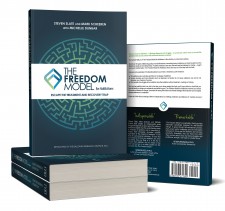Researchers Refuse to Be Silenced After Determining Low Success Rates of Treatment and Recovery - Urge Use of Evidence-Driven Complete Solution to Addiction

NEW YORK, December 5, 2017 (Newswire.com) - After 30 years of research and development at Baldwin Research Institute (BRI), a book finally appears that the authors say is a much more advanced approach to dealing with addiction than addiction treatment. The Freedom Model for Addictions: Escape the Recovery and Treatment Trap is a unique, authoritative approach to addiction informed by the authors' decades of experiencing treatment failure first-hand and then fearlessly unraveling the maze of addiction theory until finally conceiving an effective alternative, born of research and data-driven.
The Freedom Model exposes the 12 Step, treatment, and recovery models flaws as only researchers can - with scientific, evidence-based data. Under the auspices of Baldwin Research Institute Publishing (BRI), co-authors Steve Slate and Mark Scheeren have put together a comprehensive approach to addiction that is intriguingly elegant in its simplicity. Slate and Scheeren, however, go the extra mile and provide the research-based facts to support The Freedom Model.
Do you think it's more advantageous for people to believe they do have the power to change or they don't? In this question, we have captured the root problem with the idea of powerlessness. Whether people believe they can change or believe they can't, they are right.
Michelle Dunbar, Author
The Freedom Model is the result of the experiences of Slate and Scheeren, both of whom struggled with substance use issues and ended as addiction researchers. Steven Slate’s own journey of heroin use and treatment failure led him to BRI. Having gone through an early version of BRI’s educational program, Slate rejected the role of helpless addict and ended his addiction and treatment nightmare.
Slate is a research fellow of BRI and presenter for The Freedom Model Private Instruction online. He is a respected writer whose critical essays on the brain disease model of addiction have appeared in college texts on addiction including Addiction, The Taking Sides Series: Clashing Views in Drugs and Society and Clashing Views in Health and Society. His addiction blog, The Clean Slate, is well-known for its controversial yet well-evidenced discussions on addiction and treatment. He devotes his time to showing others how to self-initiate change for substance-use habits while exposing what he calls "the fallacy and dangers of addiction treatment and its 'recovery society.'" As Slate stated in a recent TEDxTalk,
“Nobody is doomed to a lifetime of addiction, until a well-intentioned yet misguided helper convinces them that they are. A personal preference for heavy substance use can’t be medically treated, but it can be changed.”
Co-author Mark Scheeren was mandated to treatment and, after finishing, found he was worse off than before. He would spend the next three decades of his life first testing and then heavily criticizing the 12 Step doctrines, arguing the doctrines are of a "highly destructive nature with an extremely poor rate of success." The road to developing an effective alternative wasn't easy and included philosophical challenges and legal roadblocks that might have deterred a less determined team of researchers and advocates. The result was an evolution of addiction research enhanced by his unique strategy of studying individuals with substance use issues by living on site with his subjects for twelve years. As he stated of the process:
“This was the only way to truly understand the issues concerning this population and to build solutions that actually promoted success. This effort created the knowledge base for the foundation of The Freedom Model for Addictions: free-will, autonomy and the Positive Drive Principle.”
Slate and Scheeren were joined in the development of The Freedom Model by Michelle Dunbar, executive director of Saint Jude Retreats, the program arm of BRI, and whose own addiction story mirrors that of Slate and Scheeren. She captures the essence of the hope found in The Freedom Model for the millions currently struggling in the treatment and recovery trap:
“Do you think it’s more advantageous for people to believe they do have the power to change or they don’t? In this question, we have captured the root problem with the idea of powerlessness. Whether people believe they can change or believe they can’t, they are right.”
To purchase The Freedom Model book or for more information on The Freedom Model approach, visit www.thefreedommodel.org.
Media Contact:
Faith Moore
Phone: 888-973-9597 Ext 3
E-Mail: media@thefreedommodel.org
Source: Baldwin Research Institute, Inc.